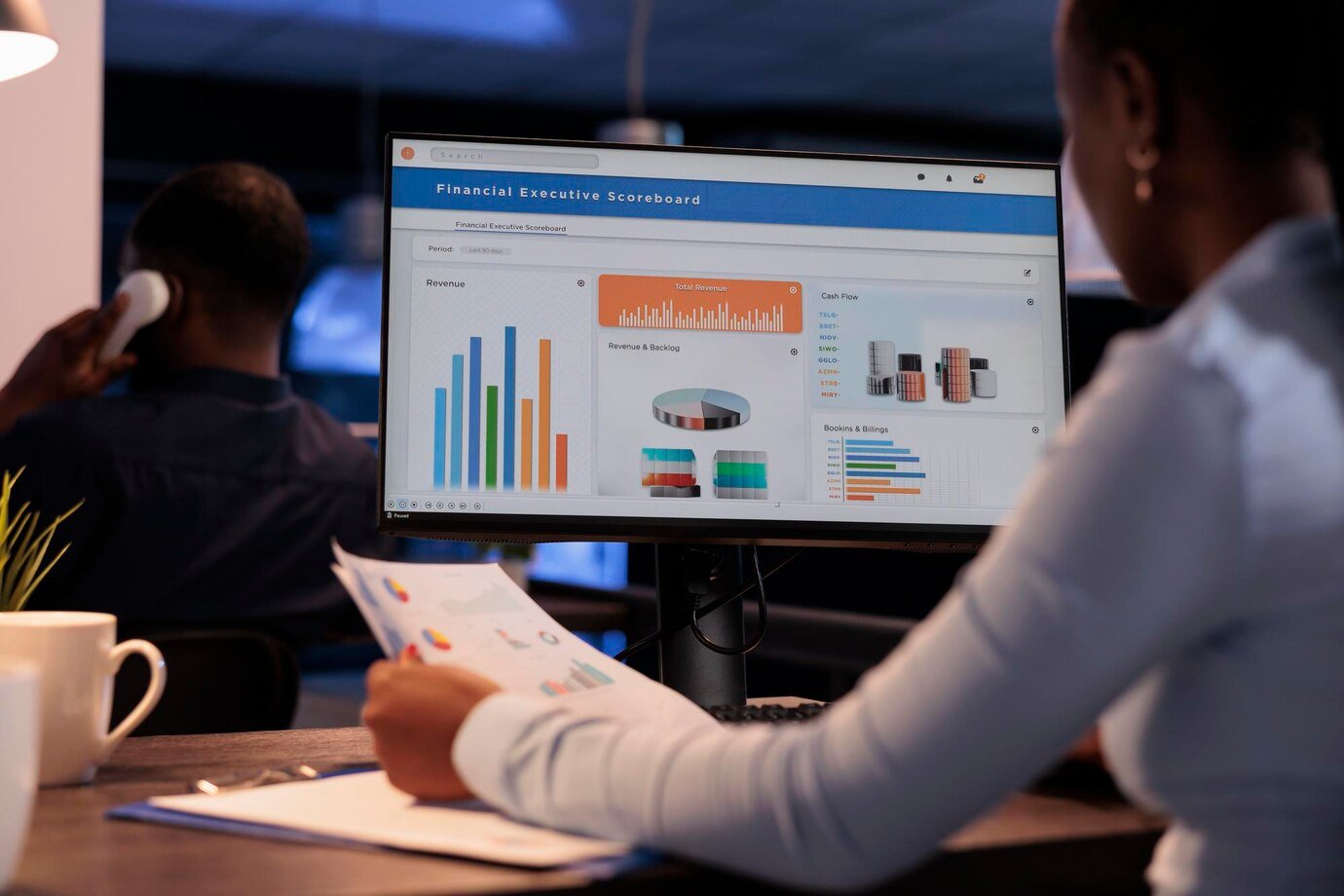Our Course Details
Available Courses
Our courses are taught by experienced professionals with a wealth of Industry experience. Our approach is beginner-friendly, practical and project-based.

Data Analysis
Discover the power of data-driven decision-making with our Data Analysis program. Learn from expert instructors and gain hands-on experience

UI/UX Design
Learn user-centered design principles and tools to create intuitive interfaces. Gain hands-on experience and launch a successful career in web, mobile, and product design.

Product Management
Learn product strategy, market research, and agile development to lead innovative products from concept to launch. Gain hands-on experience and drive business success.

Graphic Design
Master the art of Graphic Design and communicate impactful messages. Learn from industry experts and gain hands-on experience

Video Editing for Social Media
Learn video storytelling, visual effects, and motion graphics to create engaging, viral content. Gain hands-on experience and boost your social media presence.

Digital Marketing/Social Media Management
Learn SEO, social media advertising, content strategy, and email marketing to drive online success. Gain hands-on experience and transform your digital presence.

Cybersecurity
Learn network security, cryptography, threat analysis, and incident response to protect against cyber threats. Gain hands-on experience and become a certified cybersecurity expert.

CMS Website Design & WordPress
Master CMS Website Design & WordPress at Peamev Academy. Learn from industry experts and gain hands-on experience

Customer Relationship Management (CRM)
Master Customer Relationship Management (CRM) at Peamev Academy. Learn from industry experts and gain hands-on experience.

Project Management
Learn Agile, Scrum, project planning, and risk management to lead projects to success. Gain hands-on experience and become a certified project manager

Human Resources Management
Learn recruitment, performance management, and employee engagement to unlock human potential. Gain hands-on experience and become a certified HR specialist

Procurement & Logistics Supply Chain
Learn procurement, supply chain management, and logistics to streamline operations. Gain hands-on experience and become a certified supply chain expert.
GENERAL HSE
- Principles of health and safety
- Understanding the responsibilities placed on employers and employees
- Hazard identification and control
- The importance of risk assessment as a technique for accident and ill health prevention
- Understanding unsafe acts and unsafe conditions as the main causes of harm to workers (manual handling, hazardous substances, exposure to noise and vibration)
- Understanding the hierarchy of controls to eliminate or reduce hazards to acceptable level
- Understanding the relations between companies and host communities
- Appreciate how workplace equipment and task design affect health and safety
- Contributing to health and safety management system
- Understanding the effects of drug and alcohol abuse in the workplace
- Introduction to occupational health and hygiene
- Appreciate the importance of accident investigation and reporting
- Understanding environmental issues and sustainable development
- Introduction to emergency first aid
- Multiple choice question paper
ADVANCED HSE
- Advanced principles of health and safety
- Implementation of health and safety management system
- Understanding HSE statistics and records
- Appreciating the importance of security management
- Risk assessment methodologies
- Understanding safety measures while performing hazardous tasks (working at height, confined space entry, hot jobs, chemicals)
- Understanding the relations between companies and host communities (CLO responsibilities)
- Appreciate how workplace equipment and task design affect health and safety
- Contributing to health and safety management system
- Journey management and transportation safety
- Accident investigation (root cause analysis)
- Managing occupational health and safety
- Emergency action plan
- Basic firefighting, prevention and rescue
- Understanding environmental impact and waste management
- Introduction to pediatric first aid and CPR
- Multiple choice question paper
PROJECT MANAGEMENT
- Identify the Key Components of a Project
- Identify the Purpose of a Project
- Understand Project Resources
- Understand Project Constraints
- Comprehend Unstated Objectives
- Create a Project with MS Project
- Create Relationships Between Tasks
- Understand the Basics of Critical Paths
- Be Able to Subdivide Tasks
- Understand Task Float
- Represent Project Resources in MS Project
- Assign Resources to a Task
- Perform Resource Leveling in MS Project
- Update Task Progress
- Manage Part Time Resources
- Utilize Calendars in MS Project
- Edit a Project's Calendar
- Displaying Calendar Information in a Gantt Chart
- Report Resource Utilization
- Work with Project Milestones
- Use Network Diagram Video
- Use Spreadsheet Vies
- Assign a Labor Rate to Project Resources
- Record Non-Labor Project Costs
- View cost Reports
- Manage Project Costs
- Integrate with other MS Applications
- Create MS Project Macros.
OIL AND GAS PROJECT MANAGEMENT
Module 1 – Components of a Systematic for Oil and Gas Projects
- Appraisal
- Selection and definition
- Planning
- Execution
- Control
Module 2 – Controls in Oil and Gas Project Management
- Scope
- Time
- Cost
- Quality
- Resources
- Safety
Module 3 - Aspects of a successful project
- Formal project phases and checkpoints
- Clear accountability
- Checks/balances between central functions and project teams
- Constant revvalueiew of project
- Risk monitoring
- Adequate opportunities
Module 4 - Oil and Gas Development Stages Employing Project Management Approaches
- Conceptual design
- Front-end engineering design
- Long lead equipment procurement
- Detailed design
- Construction/fabrication
- On-shore commissioning
- Transportation/installation
- Hook-up and commissioning before handover to end-user
Module 5 – Project Sanctioning and Approval Process
- Idea generation and sharing
- Idea review by immediate supervisor
- Idea pitch to sponsor
- GO/NO decision
- Registration of GO ideas
- Prototype and business case refining
- Idea implementation
Module 6 – Stakeholder Management Process
- Identify stakeholders
- Identify strengths and weaknesses
- Develop a stakeholder plan
- Monitor and change plan as required
- Customer knowledge experience
- Leadership support
- Institutional factors
- Project characteristics
- Manager/Team competence
- Project organization
- Contractual aspects
- Risk and requirement management
Module 7 – Risks Affecting Oil and Gas Project Management
- Operations and costs
- Budgeting
- Regular
- Technology
- Construction
OIL AND GAS BUSINESS DEVELOPMENT
Module 1 – Aspects of a Successful Project
- Formal project phases and checkpoints
- Clear accountability
- Checks/balances between central functions and project teams
- Constant review of project value
- Risk monitoring
- Adequate opportunities
Module 2 – Oil and Gas Development Stages Employing Project Management Approaches
- Conceptual design
- Front-end engineering design
- Long lead equipment procurement
- Detailed design
- Construction/fabrication
- On-shore commissioning
- Transportation/installation
- Hook-up and commissioning before handover to end-user
Module 3 – Project Sanctioning and Approval Process
- Idea generation and sharing
- Idea review by immediate supervisor
- Idea pitch to sponsor
- GO/NO decision
- Registration of GO ideas
- Prototype and business case refining
- GO/NO GO decision
- Idea implementation
Module 4 – Stakeholder Management Process
- Identify stakeholders
- Identify strengths and weaknesses
- Develop a stakeholder plan
- Stakeholder issues
- Relationship goals
- Communication plan
- Monitor and change plan as required
Module 5 – Critical Success Factors in Oil and Gas Project Management
- External challenge
- Customer knowledge experience
- Leadership support
- Institutional factors
- Project characteristics
- Manager/Team competence
- Project organization
- Contractual aspects
- Risk and requirement management
Module 6 – Risks Affecting Oil and Gas Project Management
- Operations and costs
- Budgeting
- Regulating
PETROLEUM RESOURCES MANAGEMENT &DISTRIBUTION
Module 1 – Oil & Gas Contracts & Joint Ventures
- Need for collaboration between parties – NOC’s and IOC’s
- Alignment of interests
- Oil & Gas Contracts
- Types of Contracts
- Concession agreements
- Production Sharing Agreement/Contract (PSA/PSC)
- Technical Service Contract/Agreement (TSA)
- Joint Venture and Service agreements.
Module 2 – Petroleum Fiscal Regimes
- Comparison of fiscal regimes
- Auction theory and methods
- Similarities among fiscal systems
- Accounting aspects of fiscal systems
- Division of revenues and profits
- Concession
- Concession rentals
- Unitization agreements
- Royalties
- Profit Tax
- Corporate Tax
- Ring fencing
- State participation
- Signature bonus
- Production bonus
- Bidding for leases
Module 3 – Oil & Gas Exports and Imports Business
- Organization of Petroleum Exporting Companies (OPEC)
- Other international and multi-national organizations
- International Energy Agency (IEA)
- Oil Markets – Crude pricing regimes
- Transportation Logistics – Pipelines, Terminals and Storage
- Crude Oil Tankers
- World’s Major Pipelines
- World’s Major Terminals, Refineries
- Transportation Logistics – Losses
- Bottle necks and Chokepoints.
Module 4 – Pricing, Trading, Markets, Risk Management
- Crude oil Benchmarks
- Crude price assessment
- Oil Trading
- Total Barrel Economics
- Oil Markets – Futures
- Exposure – Price
- Hedging – risk management
- Pricing Management Considerations
- Derivatives
- Course Summary
PRODUCTION OPERATIONS (PO1&PO2)
- Introduction and Definitions
- The Functional View of the Organization
- The Process View of the Organization
- The Volume-Variety Relationship
- Demand Determination- Time series forecasting
- Demand Determination- Errors in forecasting
- Break-even analysis - linear case
- Break-even analysis - Nonlinear case
- Product-Quantity and Pareto Analysis
- Type of layouts and the objectives of Facility Layout
- Qualitative and Quantitative Data for the Layouts
- Construction and Evaluation of Layouts
- Computerized Approaches to Facility Layout
- Least Cost Method
- Dimensional analysis
- Single facility Location Problem
- Multi plant Location
- Definitions And Techniques of Work Study
- Method Study Procedures
- Work Measurement Procedure
- Activity Sampling
- Design of Incentive Schemes
- Performance Objectives Lesson
- Operations Strategy
- Definition of Productivity
- Calculations Of Total Productivity
- Productivity In Service Industries.
- Definition of Quality
- Quality of Service Industries
- Acceptance Sampling
- Control Charts for Variable and Attributes
- Total Quality management
- Introduction to Material Management Introduction
- Purchasing Activities Functions and Procedures
- Inventory Analysis
- Economic and Production Order Quantity
- Just-In-Time Policy Basic Elements and Application.
OPERATION AND MAINTENACE
- Identify the role of operations and maintenance in FM
- Identify deficiencies in building structures, exteriors, systems, interiors, and grounds and the associated health, safety, security and environmental considerations.
- Describe the elements associated with the acquisition, installation, maintenance, operation, and replacement of assets related to facility management.
- Outline the process for determining and monitoring occupant service performance expectations.
- Outline the processes for developing occupant service specifications, selecting service providers, negotiating service level agreements, monitoring performance, and resolving contract disputes.
PROFESSIONAL BUSINESS MANAGEMENT COURSE
Shipping Management &Export /Imports Administration
- Customs and Shipping Law
- Accounts and Finance Management
- Maritime Business and Business Communication
- Marketing and Maritime Economics
- Research Methodology and Organizational Behavior
- IT System and Port Planning
- Linear Trade and Linear Transport Management.
General Cargo Handling (Air, Sea, Road)
- Cargo handling
- International regulations
- Cargo segregation
- Hazardous material identification
- Cargo stowage and procedures to secure cargo correctly
- Forces acting upon cargo
- Basic cranage procedures.
TRANSPORT MANAGEMENT AND LOGISTICS
Understanding the Supply and Demand Chains
- How organization supply and demand chains work
- Objectives of supply chain management
- The key steps in purchasing
- Supplier location and selection
- Types of contracts and purchase orders
- Supplier management
- Quality Assurance
- Remedies for non-performance of suppliers.
Inventory Management
- Inventory management systems
- Establishing inventory levels
- Supplier managed inventory
- Consignment inventory
- Just in time inventory management
- Obtaining the benefits of standardization
- Utilizing ABC analysis
- Inventory management effectiveness measures
Negotiation Skills Development
- Communication and foundations of successful negotiations
- Overcoming difficulties in negotiations
- The impact of ethics
- Establishing negotiating goals
- Effective negotiating strategies
- Effective negotiating techniques
- Negotiation tactics
Managing Warehouse Operation
- Warehouse functions
- Utilizing warehouse systems
- Warehouse layout
- Inventory accuracy and cycle counting
- Bar coding identification systems
- Radio frequency identification systems
- Improving warehousing productivity
- Overcoming barriers to performance
Managing Transportation Operations
- Correct application of Incoterms
- Air carrier selection criteria
- Ocean carrier selection criteria
- Obtaining insurance coverage
- Managing truck delivery operations
- Utilizing modern tracking technology
- Effective use of consolidation
- Measuring transportation performance
TOURISM, HOTEL &HOSPITAL MANAGEMENT
Introduction to Tourism & Hospitality
In this entryway course, students will be introduced to the major concepts, issues, and theories of tourism and hospitality as an economic sector and topic of academic study. The course will cover a broad range of topics related to the travel experience, from business development to the linkages between tourism as an industry and the impacts it has on communities and places. Students will also be introduced to key elements of the hospitality service industry and opportunities for employment within this industry. The course will also introduce concepts such as sustainability, planning, and ethical responsibility. This course is required of all T&H majors. There are no prerequisites.
Tourism Product and Development
This course teaches students how to identify, develop, and promote tourism and hospitality products and services. Issues such as marketing, sales, advertising, and promotion for the tourism and hospitality industry will be explored, along with basic planning and financial topics. Case studies from Maine and New England, as well as other regions, will be used to illustrate both areas of opportunity and challenges to product development. This course is required of all T&H majors and is the entry course for the concentration Tourism Products and Promotion. There are no prerequisites.
Tourism and Hospitality Management
This course introduces students to the fundamental concepts of management related to the tourism and hospitality industry. Topics include financial management and accounting, human resource issues, hotel and resort management, food and beverage management, and event management. Examples drawn from Maine and New England will illustrate key principles and guidelines. Students will also be introduced to standards, practices, regulations and laws in the tourism and hospitality industry. This course is required of all T&H majors and is the entryway for the concentration Managing in the Hospitality Industry. There are no prerequisites.
Sustainability in Tourism and Hospitality
This course provides students with a general overview of issues related to the sustainable planning and management of tourism and hospitality businesses. Concepts such as planning, conservation of resources, monitoring and assessment, environmental audits, visitor management, and green building construction and retrofits will be discussed. The course also provides a larger global and regional perspective on sustainability issues related to tourism, such as the impact of travel on global climate change. This course is required of all T&H majors and is the entryway for the concentration Sustainable Tourism and Hospitality. There are no prerequisites.
Tourism and Community Development
Students will learn about how tourism can be used as a tool for economic development, as well as the impacts that it can have on a community’s sense of identity, control, and wellbeing. Topics will include economic development; social and cultural impacts; strategic planning; stakeholder theory; community participation; destination life cycles; marketing and promotion; and social conflict. Case studies from Maine, New England, and beyond will be used to illustrate both the positive and negative aspects of linking community development to tourism and hospitality. This course is the entryway for the concentration Planning for Tourism Development. There are no prerequisites.
INTRODUCTION TO CULTURAL TOURISM
This course explores the many dimensions of cultural tourism, including how arts, crafts, local heritage, history, and other elements of culture can be incorporated into tourism planning and development. Topics covered include the meaning, value, and potential tourism roles of historical sites and monuments, festivals and other events, local and regional arts and artisans, archaeological and other cultural heritage sites, and museums and other educational institutions. Complex issues such as cultural identity and representation and authenticity and commoditization will be explored. This course is the entryway for the concentration Cultural, Arts & Heritage Tourism. There are no prerequisites.
GLOBAL ISSUES IN TRAVEL &TOURISM
As one of the world’s largest industries, and one that brings travelers and host communities into close contact, tourism and travel are rife with challenges. This course delves into these issues from a social science perspective, showing how tourism affects travelers and communities in complex and contentious ways, from commoditization of art forms to sex tourism, drug use, and changes in local economies and culture. It also explores the connection of tourism to global issues such as infectious diseases, climate change, and terrorism. This course is required of T&H majors and also meets the USM Core requirement for Ethical Inquiry, Social Responsibility and Citizenship. Prerequisite: TAH 101 or permission of instructor.
FESTIVAL & EVENT PLANNING AND MANAGEMENT
Festivals are an important part of the tourism sector and a way that many communities attract visitors and revenue while respecting local needs and traditions. In this class, students will examine many types of festivals, from those focused around music and the arts to food, local culture, and religious or historical events. Students will learn the basics of planning and managing festivals of various sizes and durations and explore ways of promoting and marketing local events. Students may have the opportunity to visit local or regional events and learn directly about them from planners and promoters. Prerequisite: TAH 211, 221, or 261, or permission of instructor.
SUSTAINABLE HOSPITALITY MANAGEMENT
This class focuses on the practical applications of sustainability principles and techniques to the planning and management of tourism and hospitality businesses. Taught by faculty experienced in designing and implementing sustainable hospitality guidelines, it will take students through the steps of assessing planned or existing businesses and making or recommending steps to make these businesses more environmentally sustainable. State, national, and international guidelines for sustainable businesses will be examined, and students will have the opportunity to do audits or other exercises to apply their knowledge in actual settings. Prerequisite: TAH 231 or permission of instructor.
TOURISM, DEVELOPMENT & SUSTAINABILTY
Tourism is one of the largest global industries and a major source of cross-cultural interactions and cultural change. This course provides theoretical understandings of tourism’s economic, environmental, and social benefits and impacts on local communities and environments, using case studies to illustrate various types of tourism in several regions of the world. Students will conduct their own research based on published literature and other sources and present their findings in class and a final paper. Prerequisite: TAH 101, 231, or 241, or permission of instructor.
PRACTICUM IN TOURISM & HOSPITALITY
TOPICS IN TOURISM PROMOTION
Special topics related to the development and promotion of tourism and hospitality products and services will be examined. Experienced faculty from various sectors of the travel industry will share their experiences and insights, addressing the potential and challenges of developing and promoting specific types of tourism such as resorts, adventure travel, cruise ships, ecotourism, and niche businesses. Emerging trends in tourism promotion, such as new social media and participatory marketing, will be explored for their potential and limitations. Prerequisite: TAH 211 or 221, or permission of instructor.
TRENDS AND INNOVATION IN TOURISM & HOSPITALITY
Students will be introduced to major trends and innovations in contemporary tourism and hospitality, with a focus on identifying opportunities for Maine and New England. In addition to studying global and national trends in travel, the course will look at specific innovations that create new prospects for tourism in the region or demand for new types of products such as green tourism. Guest lecturers from the tourism industry, and trips to experience innovative products or services, may be employed. Prerequisite: TAH 211 or 221, or permission of instructor.
TOPICS IN HOSPITALITY MANAGEMENT
Topics related to the planning and management of businesses, events, and attractions in the tourism and hospitality industry will be explored. Faculty from industry and academia with expertise in specific topics will share their insights and experiences in managing businesses ranging from hotels, resorts, and campgrounds, to wilderness excursions and wildlife viewing, to tourism attractions large and small throughout Maine and beyond. Emphasis will be on providing practical skills and knowledge that students can use in planning and managing businesses or working within the tourism and hospitality industry. Prerequisite: TAH 211 or 221, or permission of instructor.
TOPICS IN CULTURAL TOURISM
This course looks at specific topics in cultural tourism, drawing upon experiences of regular and visiting faculty in Tourism and Hospitality. The role of the arts in tourism; interpretation of culture and history at historical sites and museums; issues in cultural heritage and identity; the challenges of performance spaces and events; and the relation of tourism to the creative economy may be examined. Theoretical and critical issues such as commoditization, cultural authenticity, and representation of identity will also be explored.
BUSINESS COMMUNICATION DEVELOPMENT &STRATEGY
Module 1: Leading Strategically
The Leading Strategically module will lay the foundation of business strategy course. You will learn about mission, vision and values and their role in overall strategy landscape. You will learn about the VARS framework for analyzing business models and SWOT framework for understanding the fit and coherence of business strategy.
Module 2: External Analysis
The Environmental Analysis module will focus on a key aspect of business strategy – analyzing and understanding the external environment of a firm. You will learn about the macro-environment of firms and the PESTEL framework for macro-environmental analysis. You will also learn about firms’ industry environment and understand how to predict industry profitability by using the 5-forces framework.
Module 3: Internal Analysis & Competitive Advantage:
The module on Internal Analysis and Competitive Advantage will provide an in-depth understanding of the origins of unique company strengths and how they can produce a competitive advantage. You will learn about the origins and consequences of fundamental internal differences among firms using the analytical viewpoints of activities, resources, and capabilities. You will be introduced to the strategic tools of value chains, value networks, and the V-R-I framework to help you analyze the implications of these within-firm differences for (sustained) competitive advantage.
Module 4: Strategic Positioning & Strategic Renewal:
The Strategic Positioning and Strategic Renewal module brings together the internal and external aspects of strategic analysis to formulate an overall strategy for the firm. You will learn about the two main “generic strategies” that businesses can pursue, which can be complemented by broad or narrow scope to yield four key types of strategic positioning. You will also learn about “dual” strategies and why and how a firm’s narrow scope to yield four key types of strategic positioning. You will also learn about “dual” strategies and why and how a firm’s strategy must be adapted to strategically renew its positioning.
JOURNEY MANAGEMENT
- Purpose of a Journey Management program
- Writing Journey Management program policies and procedures
- Journey planning process-the four stages
- Purpose and use of a risk scorecard
- Risk Assessment for journeys.
LEADERSHIP & MANAGEMENT TCHNIQUES
Module 1 – The Essentials of Leadership: Inspirational, Innovative and Holistic Praxis
Agile Leadership in the New Normal
- Leadership Principles, Perceptions and Praxis: essential themes
- Changing Paradigms, New Demands and Enlightened Leadership.
- The New Normal; changing environments, expectations and challenges
- Leadership by “design”, building agile, responsive and decisive leadership
- The Leader Within; innate qualities personality performance, style and outputs
- The External Environment; leading and navigating in turbulent times.
Leading Self and Others to Exceptional Performance
- The Leadership Management Debate. Do I Lead or Manage?
- What Leadership style does my organization require?
- 360 Leadership; competence assessment, review and peer coaching.
- Leading the focused agile team.: mission, vision values and SMARTER measures
- Communicating Organizational and clarifying team purpose
- Charismatic leaders and Storytelling: acknowledging success and lessons learned.
Inspirational Leadership: Motivational Trust, and Collective Wisdom
- Trust- the essential ingredient in the new normal
- Motivational leadership: the Emotionally Intelligent leaders
- Engagement and well-being: Scope, Support, Connection, Voice
- Diagnostic tools for organizational and team development
- Whole brain thinking divergent and convergent thinking
- Decision Making and the power of diverse thinking.
- Collective wisdom, constructive dissent and innovative outcomes
Leading a Culture of Change and Building Innovative Capability
- Leading change and transition issues ingenuity and innovation
- Solution focused methodology: Accentuating the positive and the possibilities
- Utilizing soft system methodology for innovative insights into change
- Using Nature and multiple intelligences for creative outcomes
- Assessing culture and organizational creativity for agile responsiveness
- Entrepreneurial creativity. How creative am I?
Leadership Priorities in the “New Normal Digital Age.”
- The global pandemic.: impact, learnings and responses
- Resilience, Well-being and Mindfulness: key people deliverables
- Planning for Crisis; beware the “black swans”
- Ethical leadership for sustainable organizations.
- Reframing the Business Model Canvas to create value and sustainability
- Action planning for future improvement
Module 2 – The Management Essentials: Addressing priorities in a Post COVID world
Agile Management in the New Normal
- Making the transition into management: new skills, fears and expectations
- Key accountabilities. Responsibilities, Accountabilities
- The Boss I want to become - Competencies, behaviors and priorities
- Psychometric assessment of personal management strengths
- Applying theoretical models.
- What style of management does my organization require?
- Psychometric assessment on my preferred management style
- Driving continuous change for improvement and creative agility
- Clarifying Organizational and Team Purpose
- SMARTER objectives for the 21st century
- Assertive behavior and successful performance reviews
The Dynamic Team: Focus, Solutions and Outcomes
- Creating the Highly Effective Teams: in house and remote
- Characteristics of Dysfunctional teams
- Generational issues, diversity, challenge and harnessing potential
- Team audit: evaluating current performance to initiate future targets
- Utilizing Collective Wisdom solve problems issues and crisis
- Managing Change, the “What if” Factor., Transition and Crisis.
Motivational Mindsets: Performance = Motivation + Competence
- Motivation to Engage: Scope, Support, Connection, Voice
- Communication to Connect, Clarify, Convince and Convey
- Constructive feedback, conflict and handling difficult conversations
- Coaching for individual and team success.
- Review of practice: How well do I motivate my people?
- Ten things the great boss does every day.
Prioritization in the New Normal and Digital Age
The global pandemic: impact and learnings
- What are my key deliverables post pandemic?
- The Golden Rule: achieving goals through the effort of others
- Delegation for Development. How well do I delegate?
- Presentation skills: Inform, Illustrate, Influence, Impact, Initiate
- Action planning for post workshop improvement.
BUSINESS COMMUNICATION DEVELOPMENT & STRATEGY
Good Writing –
- It Begins with Principle
- Have a Clear Purpose
- Be Audience Focused
- State Your Key Message Clearly
- Stay on Topic
- Observe Economy of Words
- Use Simple Sentences
- Consider Your Delivery Strategy
- Summing Up.
Start-Up Strategies-
- Your Launch Point
- Questioning Method
- Traditional Outline Method
- Brainstorm Outline Method
- Free Writing Method
- Scoping Your Project
- Summing Up
The First Draft –
- Getting It Down
- Get It Down First
- Build on Strong Paragraphs
- Create Transitions
- Use Design Elements to Lighten the Reader's Load
- Getting It Right
- The Editing Craft
- Editing for Content
- Editing for Style Tighten and Sharpen Those Sentences
- Editing for Accuracy
Everyday Writing
- Memos, Letters, and E-mail
- Writing Effective Memos
- Business Letters That Do the Job
- Making the Most of E-mail
- Summing Up
Presentations
- Timeless Principles
- Presentations: The Greek Way
- Four Rhetorical Devices
- Three Learning Styles
- Aim for the Head and the Heart
Backstage-
- Preparing Your Presentation
- Define Your Objective
- Understand the Audience
- Decide What to Say
- Get Organized
- Develop Effective Visuals
Show Time-
- Making an Effective Delivery
- Speaking Effectively
- Projecting a Positive Image
- Keeping the Audience Engaged
- Handling Questions
- Making Group Presentations
- Dealing with Stage Fright
- Evaluating Your Presentation
Dialogue – The Ultimate Communication
- Understanding the Other Person
- Seeing Yourself (or Your Company) from the
- Other Person's Perspective
- Creating Dialogue
- Summing Up
HUMAN RESOURCES AND MANAGEMENT
INTRODUCTION
- Meeting present human resource requirements
- What is HRM?
- Why HRM is important
- Emerging Human resource management challenges.
- Trends in HRM
- Global vs. local HRM practices
- HRM from Islamic and indigenous perspective
- Basic Islamic philosophy of managing human resource
- Conducting Job analysis.
- HR Planning
- Job Description
- Job Specifications
Staffing
- Recruiting and selecting employees
- Recruitment techniques
- Sources of recruitment
- Selection tests and Interviewing techniques.
Employee development
- Performance appraisals
- Performance management
- Training and Development
- Training the employees
- Types of training
- Techniques of training
- Developing Careers
- Career Growth
- Project Description and discussion
Compensations
- Managing Compensation
- Types of compensation
- Rewarding performance
- Pay for performance
- Designing and administering benefits
- Types of benefits
- Employee relations
PROCUREMENT CHAIN& LOGISTICS MANAGEMENT
Module one: Procurement as a Dynamic, Interactive System
- The device Approach vs. the traditional Functional Approach
- Goals of Procurements
- Developing the Strategic Procurement Plan
- Procurement Process
- Procurement together with the Supply Chain
Module two: Developing the Strategic Procurement Decisions
- Make or Buy Decision evaluation
- Vertical Integration
- Alliances and Partnerships
- Intercompany Trade
- Supplier Strategy
- The Coordination Strategy
- The Purchasing Organization
Module Three: Implementing the Tactical Procurement Decisions
- Supplier Involvement
- Value Analysis
- Quality Assurance
- Supplier Selection
- Supplier Rating as well as Ranking
- Contract Management
- IT E-Procurement and systems
- Policies and Procedures
- Staffing the Procurement Department
Module Four: Dealing with Operational Procurement Decisions
- Selecting the best Ordering Process
- Addressing Quality Issues
- Follow-up
- Overdue Orders
- Expediting
- The Payment Process
- Lowering the Cost of Procurement strategy
Module Five: Procurement Decisions as well as Procurement Performance Measurement
- The different Contingency Situations
- Contingency Management
- Spend Analysis
- Total Cost of Ownership
- Supplier Performance Measurement
- The Payment Process
- Lowering the Cost of Procurement strategy
Module six: Understanding Logistics and also the Supply Chain Logistics as well as Supply Chain Management
- Knowing the Supply Chain Dynamics
- International and also Global Logistics
- Supply Chain Operations Reference Models
- Theory of Constraints.
Module Seven: Transportation Economics
- The Role of Transportation found Logistics
- Management Key Decisions
- Kinds of Mode or perhaps Intermodal System
- International Commercial Terms in Transportation and also the Liabilities
- Documentation in Transportation
- Hazardous Materials Transportation
Module Eight: Performance, Warehouse and Risk Management
Key Performance Indicators (KPI)
Warehouse Management:
- Role within the Supply Chain
- Flows
- Equipment Selection
Supply Chain Risks:
- Operational
- Inventory
- Exchange Rates
- Financial
- Disruption
- Security
Module Nine: Procurement found Supply Chain
- Distinction between Procurement and Purchasing
- Role of Procurement and also Purchasing
- Support Operational Requirements
- Manage the Procurement Process and also the Supply Base
- Develop Strong Relationships along with other Functional Groups
- Team Roles as well as Responsibilities
Module Ten: Inventory Management
- Statistics within Inventory Management
- Financial within Inventory Management
- Selective Inventory Control Management
- Understanding Inventory Status
- Reducing Excess along with Obsolete Inventory
- Improving the Organization 's Logistics as well as Supply Chain
Module Eleven: Contract drafting
- Overview and Introduction
- Procurement Process
- Elements of Supplier Selection
- Supplier Evaluation
- The Bidding Process
- Supplier Contracting
- Contract Principles
- Contract Drafting
Module Twelve: Advanced excel formulas and functions
- Excel Formulas
- Logical Operators and Conditional Statements
- Statistical Functions
- Lookup/Reference Functions
- Text Functions
- Time and Date Functions
- Formula Based Formatting
- Array Formulas
- Charts along with graphs.
Module Thirteen: Suppliers and Customers Database Management using MS Access.
- Introduction to MS access
- Interlinking and creating Table
- Creating Forms
- Creating Queries from various tables
- Creating Reports
MARKETING STRATEGY &PLANNING
Strategic Marketing Masterclass
- The Marketing Mix
- Strategic Positioning
- Situational Analysis
- Customer Segmentation
- Pricing Strategy
- Product Lifecycle Management
- Market Development Strategies
The Customer
- Market Segmentation
- Customer Personas
- Customer Personality Types
- Understanding Value: How it is created and how it moves
- Key Account Management
- Dealing with Organization
- Behavioral Psychology: Why customers do what they do?
Crafting the Message
- Non-Verbal Communication
- Forensic Questioning Skills
- Building Significance with Payoffs
- The Science of Persuasion
- The Role of Emotion in Purchasing
- Drafting the Message
- Building Compelling Value Propositions.
Marketing in the Real and Online World
- Routes to Markets
- Harnessing the Power of Your Social Media Marketing Plan
- Implementing Online Marketing Best Practices
- Initiating a Social Media Engagement Plan
- Search Engine Optimization Strategies
- Facebook and Twitter Marketing Campaigns
- Online Reputation Management.
Creating an Effective Business Marketing Plan
- The Anatomy of a Marketing Plan
- Putting your plan together (drawing on what has been covered to date)
- Situational Analyses
- Lifecycle Management
- Product (Service Positioning)
- Pricing Strategy
- Budgeting
- Routes to Markets
- Propositions by segment
- Communications Plan
IELTS: The International English Language Testing System (IELTS) is designed to help you work, study or migrate to a country where English is the native language. This includes countries such as Australia, Canada, New Zealand, the UK and USA.
Your ability to listen, read, write and speak in English will be assessed during the test. IELTS is graded on a scale of 1-9
SAT: SAT is a globally recognized college admission test that lets you show colleges what you know and how well you can apply that knowledge. A student who takes the SAT can expect a test of reading, writing and math comprehension
GRE: The graduate record examination (GRE) is a standardized exam used to measure one’s aptitude for abstract thinking in the areas of analytical writing, mathematics, and vocabulary. The GRE is commonly used by many graduate schools in the U.S. and Canada to determine an applicant’s eligibility for the program.
GMAT: The Graduate Management Admission Test, aka the GMAT, is a multiple-choice, computer-based and computer-adaptive standardized exam that is used globally for admission to graduate management / business programs.
Join Us For a Brighter Career
We offers an opportunity to indeed Shape Your Future Today! We work together to further the mission to economically empowering African youths.
